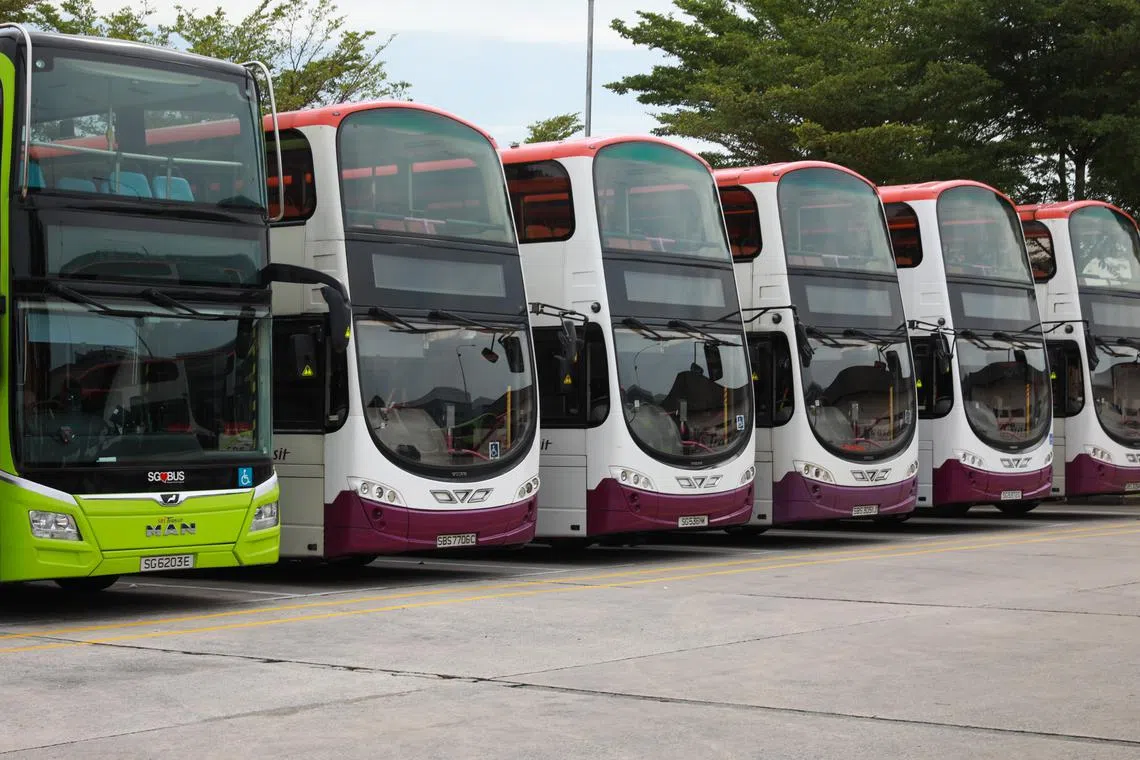SBS Transit taps AI to boost bus maintenance and road safety
Sign up now: Get ST's newsletters delivered to your inbox

SBST will use AI to receive alerts about issues with a bus, provide summaries of the issue and highlight key areas that need follow-up.
PHOTO: ST FILE
SINGAPORE - Public transport operator SBS Transit (SBST) is working with Portuguese company Stratio to improve predictive maintenance and condition monitoring for its bus fleet using generative artificial intelligence (AI).
In addition to receiving alerts about issues with a bus, the system will provide summaries of the issue and possibly highlight key areas that need follow-up. Users can ask the system questions to get answers instead of checking a software dashboard and going through the data manually.
This is the first time Stratio, which specialises in predictive fleet maintenance tools, has partnered with a public transport operator to develop generative AI technology.
The technology will be built on top of SBST’s current condition-monitoring system.
“This enhanced access to critical insights is expected to boost operational speed and streamline repair workflows, enhancing SBS Transit’s maintenance capabilities,” Ms Grace Wu, the operator’s spokeswoman, told The Straits Times on Nov 7.
“The ultimate goal is to support maintenance operations in order to provide a better service to passengers.”
SBST is also looking to AI to improve safety with an agreement signed with Singapore company TNT Surveillance, which produces mobile surveillance systems.
The operator wants to have an all-round digital mirror system that uses AI to identify vulnerable road users in the blind spots of a bus and alert the driver. SBST is looking at installing integrated blinkers with buzzers to warn pedestrians who may be near an approaching bus.
These were among the six agreements that SBST signed on Nov 6 and 7 at the Singapore International Transport Congress and Exhibition held at the Suntec Singapore Convention and Exhibition Centre.
Speaking at a panel discussion at the event on Nov 6 on the use of AI in public transport, Mr Pang Yeow Wei, head of engineering for the Downtown MRT line at SBST, said the operator chooses to deploy the technology more carefully and slowly in areas that may affect customer journeys and potentially cause service disruptions.
He was responding to a question on the preferred pace of AI introduction into public transport systems.
Mr Pang said that in areas that are “less consequential”, such as customer-facing areas including passenger service counters, SBST can deploy AI quickly.
Also speaking at the panel was Mr Kwek Hyen Chee, head of digital systems and business innovation in engineering at Strides, the business arm of fellow public transport operator SMRT.
Echoing Mr Pang’s view, Mr Kwek said he believes in moderation for the roll-out of AI in public transport to prevent “surprises” that could disrupt commuters’ lives.
Mr Kwek said public transport should continue to be affordable for all commuters, and a sudden, large-scale deployment of AI would require extensive investments that the public transport system is not yet structured for.
SMRT also inked agreements with its partners at the event.
Two were signed with Chinese manufacturer CRRC Sifang for train operations. One was a proof-of-concept contract to test the latest “reliability-centred capabilities” of its fifth-generation MRT train, and another has to do with digitalisation, advanced automation and robotics.
Expected to run until the mid-2026, the agreements will see the parties explore fitting one of the fifth-generation trains used on the North-South and East-West lines with a condition-monitoring system to support predictive maintenance activities.
Structural health monitoring technologies on board will be able to pick up micro-changes in the stresses and strains that a train goes through. The systems used by staff to monitor train information will also be upgraded to provide more detailed and accurate feedback.
SMRT said these efforts will help engineers sharpen their maintenance focus and look at train parts that require more attention.
The train’s air-conditioning system will also be upgraded with enhanced cooling capacity and eco-friendly technologies for commuter comfort.
“Together, they contribute to SMRT’s ongoing and proactive efforts in finding solutions to detect and rectify potential issues relating to the trains early, minimising service disruption,” SMRT said in a statement on Nov 6.
Additional reporting by Esther Loi



